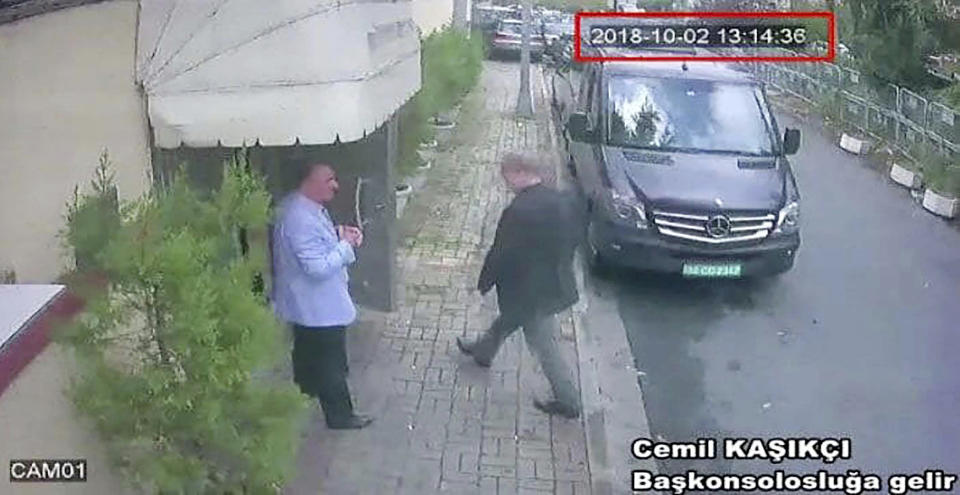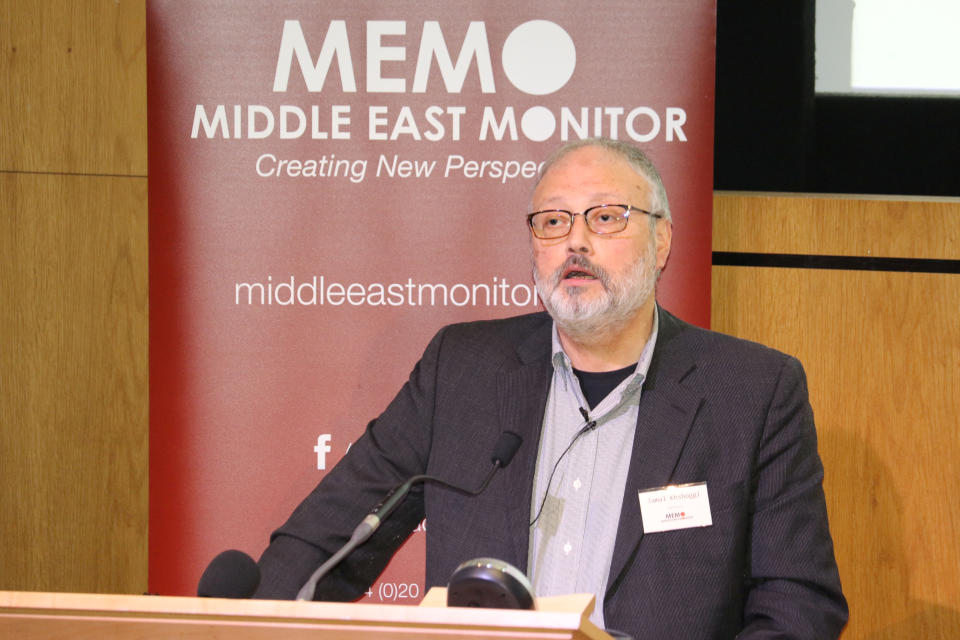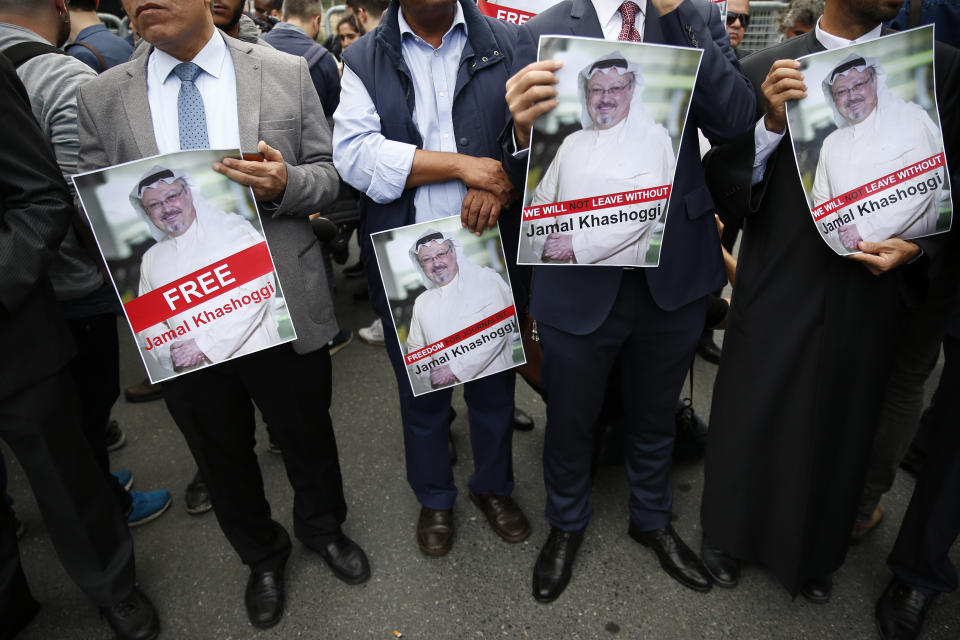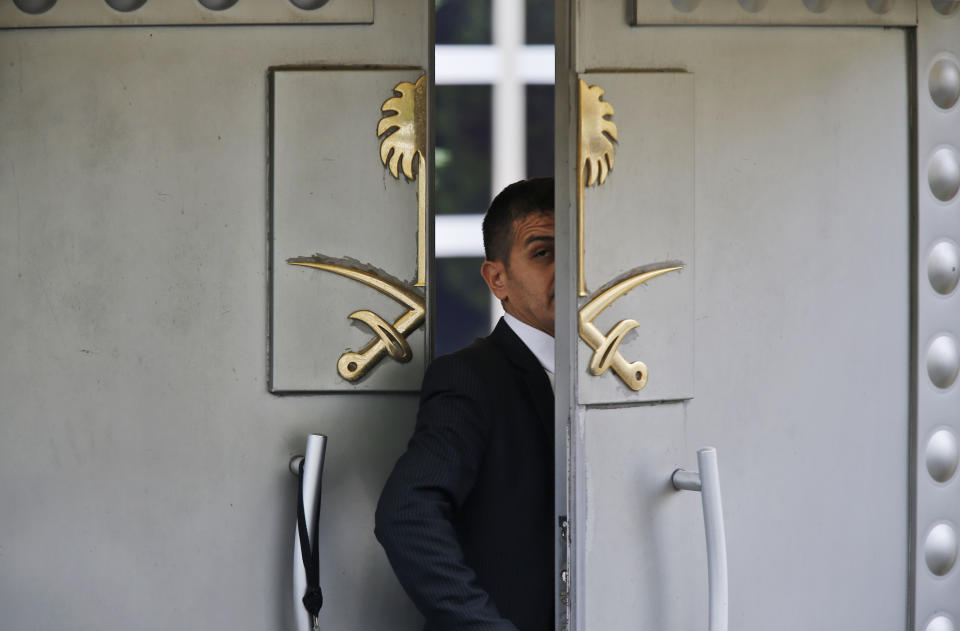Turkey prepares to search Saudi Consulate for missing journalist
ISTANBUL — With diplomatic tensions boiling over a missing and presumed dead Saudi journalist, a team of Turkish police waited outside the heavily guarded Saudi Consulate in Istanbul Tuesday as officials from the kingdom said they would agree to allow local authorities to search the premises.
The standoff caps a dramatic week that started when Jamal Khashoggi, a prominent Saudi writer, went on a routine trip to complete some simple paperwork. But after he walked into the Saudi Consulate last week, he never walked out.
The international murder mystery has sent shockwaves throughout the region as accusations fly over the disappearance of a Saudi citizen on the diplomatically immune grounds of Saudi Arabia’s compound in Istanbul.

Public CCTV images from the street outside the consulate showed Khashoggi entering it on Tuesday, but don’t show how he left. Saudi officials said their security cameras were not recording on the day of Khashoggi’s visit.
Turkish police are investigating whether Khashoggi’s body may have been hacked into pieces and removed in boxes loaded into black vans with diplomatic license plates, pro-government Turkish newspaper Sabah reported.
“We believe that the murder was premeditated and the body was subsequently moved out of the consulate,” Turkish officials said Saturday.
“There’s some pretty bad stories going around — I do not like it,” President Trump told reporters at the White House Monday night after several U.S. senators warned of potential consequences for Saudi Arabia, a key U.S. ally in the Middle East.
The Saudis have denied any knowledge of what happened to Khashoggi, but the Turks are not convinced.
Turkey’s President Recep Tayyip Erdo?an has said he is personally following the investigation, and told reporters “the consulate officials cannot save themselves by simply saying, ‘he has left.’”

Khashoggi is of the Arab world’s most prominent journalists. Over his decades-long career, he regularly appeared on television as a commentator on Middle East politics, and in 1988, he even interviewed U.S.-backed militants in the late-Cold War campaign against Soviet rule in Afghanistan. Among them was another Saudi citizen named Osama bin Laden, who would go on to become the infamous leader of al-Qaida and the mastermind of 9/11.
Before becoming a critic of the monarchy, Khashoggi had long been close to the Saudi elite, once serving as an advisor to the kingdom’s chief of intelligence. But he left Saudi Arabia in 2017 after an aggressive power grab by the young Saudi Crown Prince Mohammed bin Salman, and he began writing columns speaking out against the government.
Though initially applauded internationally as a reformer, the crown prince quickly showed his preference for ruling with an iron fist — purging disloyal royals on corruption charges, arresting scores of activists and women’s rights campaigners, and pursuing an unpopular and devastating war in Yemen.
“It was painful for me several years ago when several friends were arrested. I said nothing. I didn’t want to lose my job or my freedom,” Khashoggi wrote last September. “I have made a different choice now. I have left my home, my family and my job, and I am raising my voice.”

Friends of Khashoggi say he repeatedly told them he feared for his life, and was apparently nervous ahead of his visit to the kingdom’s consulate on Oct. 2. He needed to file papers finalizing a divorce so he could marry his Turkish fiancée, Hatice Cengiz, who was waiting for him outside the consulate. Before going in, he gave her his phone and told her that if anything happened, she should contact Turkish officials.
“Unfortunately, when she called us, it was already too late,” said Yasin Aktay, an advisor to Erdo?an. “We never had the chance to protect him or help get him out while he was alive,” Aktay told Yahoo News.
Saudi officials first told Reuters that reports that Khashoggi had gone missing were “false and baseless.” Then, in a prescheduled interview with Bloomberg reporters in Riyadh, Crown Prince Mohammed touched on the debacle, saying, “My understanding is he entered and he got out after a few minutes or one hour.” He added, “We have nothing to hide.”
But the Turks say something isn’t adding up.
Turkey’s state news agency reported investigators are paying special attention to a team of 15 Saudis who arrived in Istanbul by plane, visited the consulate at the same time as Khashoggi, and left the same day.
So far, Erdo?an has been cautious not to escalate the situation. Turkey has been at odds with the House of Saud since they found themselves on opposite sides of the Qatar-Gulf crisis last year, but they have yet to clash directly.

“This is a ‘damned-if-you-do, damned-if-you-don’t’ situation for the Turks,” says Selim Sazak, an analyst at the Washington, D.C.-based think-tank the Century Foundation.
Inaction after a brazen killing on foreign soil could be seen as giving Saudi Arabia a green light to continue clamping down on dissidents without any repercussions, says Sazak.
“If the Americans and Europeans aren’t willing to do more than give MBS a slap on the wrist, then Turks are going to have to ask themselves, ‘Can we fight this fight alone?’” Sazak told Yahoo News, using an acronym to refer to Crown Prince Mohammed.
The crown prince has been emboldened in recent months after a diplomatic spat with Canada that started with a tweet and ended with none of Canada’s allies coming to its aid after it faced massive sanctions from the Saudis for criticizing its record on human rights.
“The worst impulses of brutal regimes are coming forward because no one is standing up against them,” says Ned Price, former National Security Council spokesman in the Obama White House.
“The Saudis obviously have a lot of leverage, as we saw with their attempts to bully the Canadians,” Price told Yahoo News, adding, “I suspect the Turks wouldn’t want to risk the massive retaliation the Saudis can muster.”

Relations between Turkey and the U.S. have never been worse, amid economic and political crises, and anger over Americans jailed on charges of links to terrorist groups.
Trump is known to be staunch supporter of the Saudi royal family, and White House appointees have rarely criticized the kingdom.
But a number of Democratic and Republican senators have stepped out of line to warn Saudi Arabia that while it may be an ally, its actions could have repercussions.
Sen. Lindsey Graham, R-S.C., said “there will be a heavy price to be paid, economically and otherwise” if the Saudi government is found to be guilty of any wrongdoing.
Shawn Carrié is a journalist covering conflict, migration and human rights in Iraq, Syria and Turkey.
_____
Read more from Yahoo News:

